- Home
- Pat Barker
The Silence of the Girls Page 7
The Silence of the Girls Read online
Page 7
But I thought about them, as I got ready for dinner. I paid careful attention to my appearance, as I always did. Achilles’s obsession with my hair and skin hadn’t made me feel any more secure; rather the reverse, in fact. It had come on so suddenly, I felt it could turn equally quickly into revulsion. So I made sure that, in public at least, I was exactly what he wanted: visual confirmation that he was, as he’d always claimed to be, the greatest of the Greeks.
It was so hot in the hall at dinner, it actually hurt the inside of your nose to breathe. Body heat, burning torches, even the smell from platters of roast beef combined to thicken the air. The talk was still about Agamemnon’s treatment of the priest. Nobody liked it. Nobody understood it. A ransom like that, for a girl, and he’d turned it down? Was he mad? Even Achilles, when I leant over to pour his wine, was talking about Agamemnon’s refusal of the ransom. “Why didn’t he take it? He’s the greediest man alive.”
“Perhaps he loves her,” Patroclus said.
“Love, bloody old goat doesn’t know what love is.”
And you do? I thought, moving on.
I was starting to see some of the men as individuals—most of them tolerable, one or two of them definitely not. Myron was a middle-aged, corpulent man with a mass of curly, coarse black hair beginning to turn grey. I suppose he must have fought at some stage, but he wasn’t fighting now. His job was to oversee the maintenance of the ships. It was an important position: Achilles carried out frequent raids on cities up and down the coast and needed his fleet to be kept seaworthy at all times. I’d noticed rotted rigging on the ships of some of the other kings—even, on one occasion, unrepaired damage to a hull—but you didn’t see anything like that in Achilles’s camp; his ships could have put to sea in a matter of hours. Myron carried out his duties meticulously. He was a man I disliked—personally disliked, I mean—though for no better reason than that the glances he directed at me were bolder, more crudely appreciative, than the other men’s. He never said anything, of course—he wouldn’t have dared—but he stared at my breasts as I bent over him and made little smacking noises with his lips, as if he were looking forward to the wine I was about to pour.
That night I poured his wine—quickly, as I always did, because I hated being near him—and then, stepping back, I noticed the tunic he was wearing. It was one I’d woven for my father. In fact, I’d finished it only a few days before I was carried on a litter to my new husband’s house, the journey every girl must make. The embroidery on the back of the tunic wasn’t particularly good—I’ve never claimed any great skill at weaving or sewing—but love had gone into every stitch. Of course this wasn’t the first time I’d experienced that jolt of recognition; the day after my arrival, I’d noticed a gold serving dish from my husband’s palace standing on a side table in the hall. But this was personal. I looked down at the fleshy folds in Myron’s neck and once again the prayer sounded in my mind, involuntarily, almost as if the words were speaking me.
Lord of mice, hear me!
Lord of the silver bow, hear me!
Lord whose arrows strike from afar, hear me!
God of plague, hear me!
10
Everybody was unsettled by the heat. Quarrels broke out in the hall, one of them developing into a fight. Even Patroclus, normally so conciliatory, having dragged the combatants apart, hit one of them and rammed the other hard against the wall. There was a surly silence after that and the gathering broke up without the usual singing.
Even after dark, the sky retained a yellowish tinge, seeming to press down on the camp, trapping the heat inside like the lid on a cooking pot. After the dinner dishes had been cleared away, I sat alone in the cupboard waiting to be called. Iphis had been taken ill that morning with a stomach upset that was going round the camp. It was unusually quiet—no sound of music or conversation from the next room. After a while, tired of being cooped up in the hot, airless box, I went outside and found Patroclus sitting on the veranda steps, alone.
Immediately, I started to go back inside, but he motioned me to sit beside him. Achilles had gone for a swim, he said. Something in his voice made me turn to look at him. I could see the whites of his eyes and the gleam of his teeth when he smiled, but very little else. The camp was almost totally dark. No moon, no stars. Here and there, cooking fires still burned, but nobody wanted to sit around them in this heat. Far away in the distance, like a glimpse of another world, the lights of Troy glittered on the hill.
It should have been pleasant, sitting outdoors on a warm evening, but sweat prickled in every fold of skin and there was no cooling breeze to free you from it. Huge black insects—not moths, I don’t know what they were—fluttered round our faces and had to be batted away. The rotten smell from the rubbish dump had spread into every corner of the camp—you could even taste it. I envied Achilles his plunge into the sea, but there was no way I could follow him down to the shore, not with Patroclus sitting there. Though I wondered a little why he didn’t go. Perhaps Achilles had expressed a wish to be alone. Apart from one particularly vitriolic diatribe against Agamemnon, he’d been unusually quiet at dinner.
We went on sitting side by side. For a while, neither of us spoke—after all, what could we possibly have to say to each other, Prince Patroclus and Achilles’s bed-girl? (That was by far the most flattering name for what I was.) But then, the heat, the silence, the darkness of the night seemed to bring the impossible within reach. I heard myself say: “Why are you always so nice to me?”
At first, I thought he wasn’t going to reply, that I’d gone beyond what was permissible in a slave. But then he said: “Because I know what it’s like to lose everything and be handed to Achilles as a toy.”
His honesty winded me. But at the same time I was thinking: How can you know? You, with all your privileges, all your power, how could you possibly know what it’s like to be me? Did I ask the question? I very much doubt it, but perhaps it shaped itself in the space between us. Either that, or he just needed to talk.
“When I was ten I killed a boy,” he said. “I didn’t mean to do it, he was my best friend, but we fell out over a game of dice. He said I was cheating, I said I wasn’t, one thing led to another and I hit him. He fell down and I thought that was it, it was over—I’d actually started to walk away. But then he jumped up and head-butted me—broke my nose.” He raised a hand to touch the flattened bridge. “I was in so much pain I couldn’t think, I just grabbed a stone and hit him with it. I thought I’d only hit him once, I only remember doing it once, but that’s not what happened because there were other boys there and they said I went on hitting him—and it must’ve been true because his face was smashed in. By the time they pulled me off him he was dead. Well, of course it was murder. His father was a powerful man. So I was sent into exile, shipped off to stay with Peleus, Achilles’s father, not just for a few months either. For ever. And there was Achilles.” He was staring straight ahead of him, without expression. “I don’t think I’d ever seen a more miserable boy—well, except when I looked in the mirror. His mother had just left.” He hesitated. “You know she’s a sea goddess?”
I nodded.
“It wasn’t a happy marriage. One day she just got up and walked into the sea. She’d done it before, she was always doing it, but this time she didn’t come back. Achilles wouldn’t eat, he wouldn’t play with the other kids, I think he actually stopped growing. It’s hard to believe but he was quite a little runt when I met him. Peleus was at his wits’ end, so I came in very handy, because I had to be Achilles’s friend.” He laughed. “But it was good for me too.”
“How?”
“He calmed me down.”
“Peleus did?”
“No, Achilles. Yes, I know, hard to believe, isn’t it?”
Some distance away, there was a burst of singing, ending in laughter. I felt rather than saw him turn towards me. “You watch us all, don�
�t you?”
I shook my head.
“No, you do.”
It wasn’t a comfortable feeling, knowing my watchfulness had been observed.
“And I hear you crying sometimes…”
“You can’t always help it. Well, women can’t. I’m sure you never cried.”
“Every night for a year.”
This was said so lightly it was hard to tell if he was being serious or not. I nodded towards the beach. “A long swim.”
“She might be there.”
For a moment, I didn’t understand. “You mean his mother?”
“Yes.”
“She still comes to see him?”
“Oh, yes.”
Again, a note in his voice I couldn’t place. Bitterness, perhaps? I remembered Achilles on the beach, the weird, bubbling, non-human speech, the repeated word—the only word I understood, or thought I understood: Mummy, Mummy. What would it be like to love such a man? “Do you regret it?”
“Growing up as Achilles’s foster-brother? Not in the least. We-ell, obviously I regret killing my friend, but…No, they were very kind to me.” He sat motionless for a minute or two, before suddenly slapping his knees. “I think I might have a walk down, see what he’s up to.”
“Why do you worry about him so much?”
“Habit.” He stood up. “You do know, don’t you, that he…”
I waited for him to go on, but he just smiled and turned away.
I was free to go now—I supposed—back to the women’s huts, but after that conversation I couldn’t settle. I decided to walk a little way along the path that led to the beach. My heart kept skipping beats and I didn’t know why. I came out onto the beach at the place where the stream meandered over a pebbly bed towards the sea. Achilles and Patroclus were on the far side, close to the high-water mark. I was too far away to hear what they were saying, but I thought from their gestures they might be quarrelling. Once, Achilles turned his back and Patroclus grabbed his arm and wrenched him round again. For a moment, they stood facing each other, not speaking, then Achilles moved in closer till he was resting his head against Patroclus’s forehead. They stayed like that without moving or speaking for a long time.
I stepped back into the shadows. I knew I’d stumbled on something too private to be witnessed. There were always those, then and later, who believed Achilles and Patroclus were lovers. Theirs was a relationship that invited speculation: Agamemnon, in particular, couldn’t leave it alone, though Odysseus was nearly as bad. And perhaps they were lovers, or had been at some stage, but what I saw on the beach that night went beyond sex, and perhaps even beyond love. I didn’t understand it then—and I’m not sure I do now—but I recognized its power.
11
Next morning, when I walked through the dunes to see Hecamede, there were forty-seven dead rats. I counted every one.
* * *
——————
The punishing heat continued. The men came back from the battlefield one evening grey-skinned, exhausted—ready to lash out at each other or, more often, take it out on the slaves. Tepid baths, food and drink had to be provided immediately. My face shuttered, I waited at the table, loathing them all. I even avoided looking at Patroclus because I was ashamed of liking him. Instead, I concentrated on the men who bent over their plates like pigs guzzling in a trough. Myron was wearing my father’s tunic again; he seemed to have grown fond of it. When I leant over his shoulder to pour his wine, his thick, pasty tongue came out and flicked around his lips and a pulse began to beat inside my brain: Lord of mice, hear me, lord of the silver bow, hear me…I don’t know how I got through that night, but I did.
* * *
——————
Next morning when I passed the rubbish dump there were too many dead rats to count.
* * *
——————
We knew the camp was overrun with rats. How could it not be—so much meat and grain wasted, half-eaten food left lying around? You heard them at night under the floors, rustling and squeaking. Normally, during the day, the prowling dogs would keep them out of sight, but not now. Now, they seemed to have lost all fear, coming out from under the huts to die in the open air, and always with that terrible squealing, the sudden flowering of red blood at the end. The dogs couldn’t believe their luck, so many rats, no need to hunt…But there were too many to eat, and soon the little black corpses dotted every path. Men walking along would kick them underneath the huts, where they swelled up and stank.
Myron hated it. He was responsible not only for the maintenance of the ships but also for the upkeep of the compound. Every rat that died in the open was dying on one of his paths or—worse yet—on one of his verandas. Of course, he had a whole squad of men to clear them away, but it was interesting to see how often he picked up the dead rats himself, as if he couldn’t bear the sight of them a second longer. And always, after dropping them into the sack he carried around with him, he’d wipe his fingers fastidiously on my father’s robe before drawing the back of his hand across his upper lip.
Not long after, the dogs and mules began to die. Unlike the rats, they couldn’t just be piled up somewhere out of sight and left to rot; they had to be burned. And so the fires started. Round about this time, you noticed men darting quick glances at each other out of the corners of their eyes, though nothing was ever said. Over the evening meal, the laughter sounded a bit forced, perhaps, but then, as the dishes of wine were carried round, everybody relaxed. And, my god, how they drank! Every evening they staggered away from the table, flushed, boastful, bombastic, afraid…And Achilles, who drank less than anybody, flicked his gaze from face to face, watchful, assessing the mood.
On one particular evening, I’d just finished pouring wine into Myron’s cup. Because I hated his lip-smacking, the carefully casual way he moved his arm so that it brushed against my breast, I always tried to pour his drink as quickly as possible—and without getting too close. This time, I misjudged the distance and some of his wine slopped over onto the table. It really shouldn’t have mattered. Looking up and down the tables, you saw more than one pool of spilled wine. But it made Myron angry, to the point where there were veins standing out on his forehead; he was a man who became ridiculously upset over trifles. As soon as it happened, he was on his feet dabbing away with a cloth, muttering to himself. He was about to sit down again when a movement caught his eye. Standing immediately behind him, I could follow the direction of his gaze. A rat was running along the floor between the two long tables.
So far, nobody else had seen it. But then it began to stagger from side to side, letting out that terrible scream before finally toppling over onto its side and vomiting blood. By now, several people had turned to stare. A wave of silence ran along the tables as one by one the men stopped eating and craned to see what was going on. A dead rat? Well, one dead rat wasn’t going to spoil the pleasure of food and drink. They’d already turned back to their plates when Myron staggered to his feet. He stood staring at me. “You,” he said. “You.”
Evidently I was responsible for the dead rat as well as the spilled wine. He just couldn’t bear it. The rat was half hidden in the rushes, but that didn’t matter: he knew it was there and he kept glancing across the room to the small table where Achilles and Patroclus sat. Achilles didn’t seem to have noticed the rat, but at any moment he might—and to Myron that prospect was intolerable. Grimacing with disgust, Myron walked a few paces, picked up the dead rat by its tail, took it to the door of the hall and threw it outside. Ironic cheers from the men, some of whom started drumming on the table as he walked back to his seat: Why was he born so beautiful?…Myron, sweating, wiped his hand on the side of my father’s tunic, while the men went on bellowing the song, giving a final ironic cheer as he took his seat.
I moved on quickly, getting as far away from him as possible. And that day ended as every o
ther day had done, listening to Achilles play the lyre, lying underneath him in his bed at night, gritting my teeth as he bit my breasts and tore at my hair. Afterwards, in the darkness, I closed my eyes and prayed: Lord of the silver bow, lord whose arrows strike from afar, avenge your mice…
* * *
——————
Next morning when I stepped out onto the veranda I trod on something soft. Oh, I thought, the rat. But when I looked down there were many rats, ten or twelve of them at least. I wondered what force drove them out of their dark, confined spaces to die like this in the open air.
They weren’t the only rats I saw that day. I watched a group of Myron’s men kicking a large rat around the beach. The narrow spaces between the ships were black with their bodies. All day long, Myron patrolled the paths, jabbing his spear as far underneath the huts as he could reach. The slave women kept out of his way as best they could. Somehow, in spite of this invasion, the camp and especially Achilles’s hut had to be kept clean, tables scrubbed, fresh rushes gathered and laid on the hall floor, then baths prepared and food cooked—all this under the supervision of a man who seemed utterly distraught. I’d never seen a man work so hard and with such an air of desperation. But, in spite of all his efforts, the rats defeated him. Striding along the veranda, tugging at the buckles on his breastplate, Achilles stumbled over a dead rat and with an exclamation of disgust kicked it far out into the yard. The look on Myron’s face at that moment would have melted any heart less cold than mine.

 Border Crossing
Border Crossing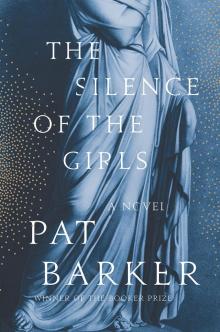 The Silence of the Girls
The Silence of the Girls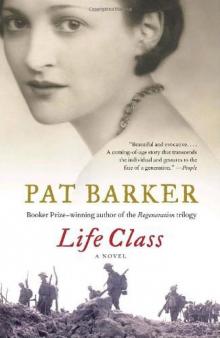 Life Class
Life Class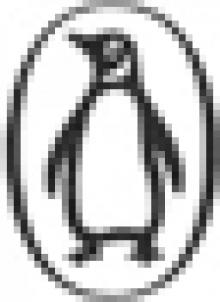 Regeneration
Regeneration Another World
Another World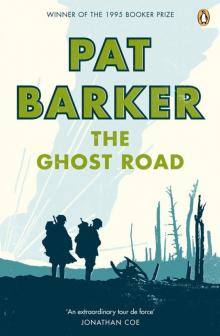 The Ghost Road
The Ghost Road Double Vision
Double Vision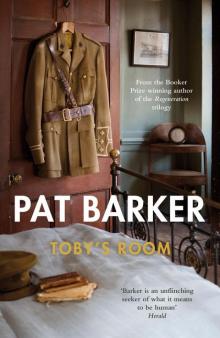 Toby's Room
Toby's Room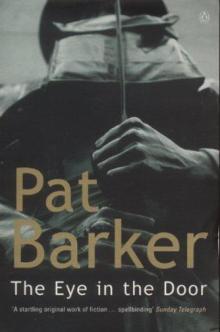 Regeneration Trilogy 02 - The Eye in the Door
Regeneration Trilogy 02 - The Eye in the Door The Eye in the Door
The Eye in the Door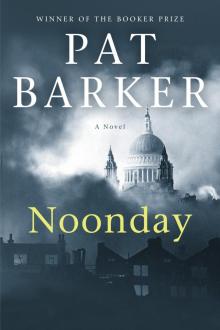 Noonday
Noonday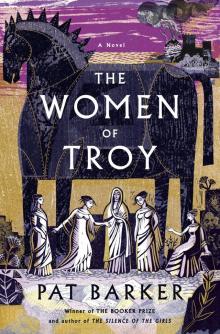 The Women of Troy: A Novel
The Women of Troy: A Novel